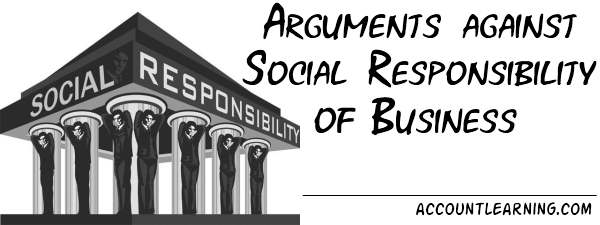7 Arguments against Social Responsibilities of Business
Arguments against Social Responsibility
Keith Davis elaborately discussed the various points put forth by classical economists in support of their contentions in an article under the style, “The Case For and Against Business Assumption of Social Responsibilities”. This article was published in the “Academy of Management Journal” in June 1973.

Milton Friedman, the Nobel Laureate also vehemently, criticized the concept of assumption of social responsibility. Here we shall give a brief account of the points cited by Milton Friedman and others.
1. Businessman should mind his Business: The only business of a devoted businessman is to do his business efficiently. He should concentrate only in his line of business. He should not get involved in the social matters. If his attention is diverted into social problems, the survival of his business unit itself shall become a question.
2. Burden of Additional Costs: The businessman should confine his activities to his business only. Any assumption beyond the economic necessities and legal obligations or stipulation would mean some additional costs.
3. Lack of Competence: The outlook of business managers is primarily economic and technological. They are not trained nor they do have possessed the requisite skills or resources to determine which project is socially desirable and needs support. Hence, if their judgment fails, the amount spent on such projects shall become a waste.
4. Dilution of the Principal Purpose: Improving economic productivity and maximizing profitability are the twin basic objectives of any business enterprise. Diversion of business interests into social actions shall amount to over looking of these two objectives. Failure to fulfill this basic mission will lead to a failure of the business both in its economic and social roles.
5. Business should not be given too Much Power: Social action programmes should be left to the Government and other Social Welfare Organizations. If business were given a chance to involve itself in such programmes also, it would lead to excessive concentration of power.
6. Deterioration of Free Enterprise Economy: Assumption of unrelated social responsibilities shall lead to the deterioration of the free enterprise economy. In a free enterprise economy, there can be or should be one and only social responsibility of business to use its resources and engage in only those activities which can increase the profits of the business enterprise.
7. Lack of Accountability: Responsibility and accountability should go together. There is no means or mechanism to ensure accountability from business to public. Hence in the absence of any mechanism, it is meaningless to talk about responsibility to the society. Such a proposition is not logical also.
Eminent scholars put forth the above line of arguments. Most of them are logical and related to the realities of the situation.

